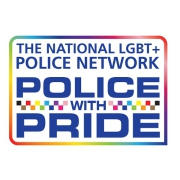National LGBT+ Police Network Social Media
The National LGBT+ Police Network have implemented a new communications strategy for 2022-2023, within which are new guidelines for our social media.
Communications Lead Paul Bloomer explains,
Police officers have a duty to protect the public and keep people safe. This of course extends to our network’s members and people who come to our communication channels to learn about us. There have been instances where individual officers, community members and Police LGBT+ staff networks have been subject to abusive language and other ‘trolling’ type behaviours. We needed to take steps to protect the members of our networks and the community. We worked with Police Services, communications experts and legal advisors to put together a set of guidelines for the management of our social media.
The new communications strategy explains what content and conduct could result in us taking action, any content posted to our communication channels that:
- Targets an individual or other entity in a derogatory or defamatory fashion.
- Includes names of victims or suspects, accusations or anything that could harm or jeopardise ongoing investigations or legal action.
- Provides details of unsubstantiated allegations.
- Incites, advocates or expresses obscenity, vulgarity, profanity, hatred, bigotry, racism, or violence.
- Provides or creates links to external content that violate our terms laid out in this document.
- Threatens, stalks, defames, defrauds, degrades, victimises or intimidates an individual or group of individuals for any reason; including on the basis of age, gender, disability, ethnicity, sexual orientation, race or religion.
- ‘Junk mail’, ‘spam’, ‘chain letters’, ‘pyramid schemes’, ‘affiliate marketing’, or unsolicited commercial advertisement.
- Content for any other reason is considered inappropriate by the communications lead.
What we will do: The National LGBT+ Police Network reserves the right to determine breaches at our discretion. If a user’s actions or behaviour is considered in breach of our guidelines we may without notice;
- Restrict that users ability to contact the National LGBT+ Police Network via social media platforms
- Remove or hide comments, photos, videos or any other content
- Report content or accounts to social media companies to review and remove
- Report content for investigation to any relevant Police Service
- Implement bans from National LGBT+ Police Network social media platforms
- Bans from National LGBT+ Police Network platforms are permanent and can only be reviewed under very exceptional circumstances.
Paul continued,
If we have restricted a user from our social media channels, and they feel they have been treated unfairly, a request should be sent through the ‘contact us’ form on our website. Being restricted from our social media doesn’t prevent anyone from contacting Police should they ever need to, 101/999 and online reporting systems are still available to them, our website and social media channels have never been a method of reporting crime. The National LGBT+ Police Network is not responsible for the content of any user-created posting, listing or message, other than those we have posted ourselves.




